
20:12, 29-Aug-2018
Tackling Taboos: Indian government scraps controversial 12% tax on women's sanitary products
Updated
19:29, 01-Sep-2018
03:11

Next is Asia Focus.
The Indian government has scrapped a controversial 12 percent tax on women's sanitary products. The move comes after months of campaigning sparked by a Bollywood film on menstrual hygiene --PADMAN. Various steps are now being taken to challenge the taboo and make women's sanitary products more accessible both in cities and in rural areas.
Mintu Mishra makes sanitary napkins for rural women with used cotton clothes. When she first arrived in Delhi she was ashamed of her period but after she started working here she understood that periods are a natural part of being female. Then began her journey to inspire others by gifting them the sanitary napkins she makes and making them understand that its all ok.
MINTU MISHRA SANITARY NAPKIN MAKER "I explained to my daughter how to make sanitary napkins at home. I take some for her from here as well. I did not feel ashamed to talk to my daughter about periods. I was ashamed to talk to my mother about it or even ask her for a piece of cloth, but I took napkins from her."
For Mintu Mishra and her friends, life has changed. They make sanitary napkins to change the lives of other women living in the rural areas who have no access to feminine hygiene products.
According to India's National Family Health Survey, more than 40% of Indian women aged 15 to 24 do not have access to sanitary products during their period.
ANSHU GUPTA SOCIAL ACTIVIST "I think access is getting addressed through policy level. All those issues are being addressed much more than awareness and the fact that the women are not able to talk about it even though they have access."
Interventions to create awareness among the young ones is the first step to address the stigma attached to periods. Workshops like these challenge the reluctance of the society to talk about menstruation and places biological facts before the adolescents. Their ignorance and lack of knowledge often result in adverse health outcomes.
DR. SURABHI SINGH GYNA ECOLOGIST "Pads are so expensive that you cannot afford to change it within six hours. So that becomes a source of infection. This leads to vaginal infection, uterine infection and then tubes get infected. Lack of hygiene becomes a source of ectopic pregnancy and infertility. Unhygienic menstrual condition is the biggest problem."
To overcome the shame around periods is still a mammoth task in India. Small steps like distribution of sanitary napkins in schools empower girls to speak about the issue without any embarrassment. Ravinder Bawa, Delhi.

SITEMAP
Copyright © 2018 CGTN. Beijing ICP prepared NO.16065310-3
Copyright © 2018 CGTN. Beijing ICP prepared NO.16065310-3